
Who needs books when you can jump on YouTube, kick your feet up and rest your eyes, right?
I get it. I’ve been there. I used to be repulsed by sight of books and libraries. Silent reading time? No thanks. That bookworm on all those library posters? A little creepy. The school librarians? Downright scary.
It wasn’t until much later in life that I discovered my love of books and reading.
Why bother to read books?
Dr Seuss wrote in his classic book I can read with my eyes shut!:
“The more that you read, the more things you will know. The more that you learn, the more places you’ll go.”
Books can be mind expanding and life changing. The words of a good author can trigger new insights, knowledge and act as a catalyst for change.
When you read a book, you’re also training your brain to ignore everything else that’s going on and focus on the page. With deep focus comes deep learning.
In contrast, when you read online the presence of hyperlinks propels you to click. Before you know it, you can be lost in a sea of information. What were you supposed to be doing again? You have no idea!
This is why reading a book (with pages you can feel and turn with your hands) is so valuable: it’s so much easier to stay focused.
Tips to kick-start your reading adventures
Want to read more books and develop the skill of finding a good book? Then resist the urge to click away. Stay with me and keep reading!
Below are some tips to help you discover a love of reading (and trust me, it’s never too late to get started).
1. Choose books that are easy to get into
Some books can feel like a hard slog. Go easy on yourself and start off with some graphic novels. For me, graphic novels were like a gateway drug into the world of books. Since illustrations are the star of the show, you can churn through a graphic novel and find yourself engaged within the first minute.
And graphic novels are not just about super heroes. You can find graphic novels that are adaptations of old classics (e.g. The Great Gatsby). They can also cover a range of real world issues. Check out Joe Sacco’s graphic novels that cover the human impact of conflicts around the world.
2. Don’t worry about your reading speed
I used to think that I wasn’t good at reading because it took me longer than the others to read. So when I finished high school, I signed up to a speed-reading course.
The teacher taught us how to read multiple pages in less than a minute. I felt like an absolute champion! That was until they tested my reading comprehension. It was close to zero.
You have to ask yourself the question, “What’s the point of reading so fast if you don’t understand anything?”
Over the years I’ve learnt to embrace my slow reading speed.
No one cares about how fast or slow you read. Remember, this isn’t a race. The whole point of reading is to learn new ideas and improve your life.
3. Don’t be afraid to make a mess of your books
A few years ago, I was looking through my best friend’s book collection. I noticed that she had highlighted sentences on every page of every book. At the time, I was horrified. Why in the world was she making a mess of her beautiful books?
A few years later, I realised my friend was onto something. While working on my PhD I noticed that after reading a book, the ideas would be fresh in my mind for about a week. But after that I couldn’t remember what the book was about. I just had some vague sense of whether the book was good or not. That was about it.
I took a step back and asked myself, “What’s the point of reading?” The answer was simple: we read to learn. If you want to learn information and remember that information, then you need to make a note of it. So I’ve let go of the idea of keeping my books in pristine condition.
For the love of learning, I now give myself permission to make a mess (unless it’s a library book). I’ll write in the margins, highlight key bits of information and post-it note paragraphs that make me go ‘A-ha!’. A week or two later (once the ideas have had time to simmer away in my brain), I’ll go back and mind map out the key ideas.
4. Join your local library
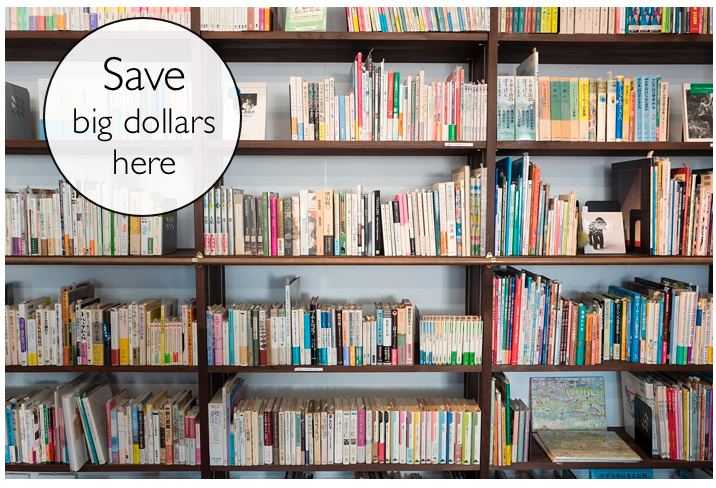
If you don’t make good use of your library, one of two things is going to happen:
1) You’ll go broke; and/or
2) You’ll end up like the hoarder next door with piles of books in your bedroom.
I will often walk out of my local library with a huge stack of books. Do I end up reading all of them? No. Do I care? Not really. It’s a free service. If at some point I want to read those books, I’ll take them out again.
Set yourself a challenge to spend 20 minutes walking around your library to explore the books. Get a sense of the books and different categories on offer. Don’t just limit yourself to the young adult section. Go and explore the psychology section, the cookbooks, the magazines, the art books, etc. Get a feel for what you like and don’t like.
5. Use inter-library loan services
Not a fan of the books in your local library? No problem! Remember, local libraries tend to cater for a general audience. So if cake decorating, backyard poultry or DIY home renovation ain’t really your thing, I get it!
This is where you’ll need to refine your reading tastes by jumping on Amazon. With Amazon, you can find books on all sorts of obscure topics. Make a list and then go ask your local library if they can source the book from another library through the inter-library loan service.
6. Spend some time in a good bookshop
The great thing about bookshops is that they stock the latest books. Libraries will eventually get these books but it may take a few months for them to be processed through the system.
Most bookshop owners are happy for you to browse in their shop. They’ll often have a couch or chair for customers to sit on. If you’re going to sit and browse, just make sure you take good care of the books.
While I’m all for supporting local bookshops, resist the urge to purchase every book you like the look of. Before you make a purchase…
7. Jump on Amazon

Amazon is great for three things:
1) The reviews/ratings;
2) Showing you similar books to ones you really like; and
3) Allowing you to preview the book.
Use Amazon as a research tool to pin point great books. Copy down the titles and call your local library (see point 5. Use inter-library loan services).
Warning: you can spend hours and hours of your life on Amazon. I recommend you grab a timer, set it for 20 minutes and have a browse. Once the timer goes off, stop and go do something else.
8. Ignore reading snobs
One of my relatives tells me I should read books about Croatian history. “Do you know anything about history?” she’ll say in a condescending tone.
This relative is what I’d call a reading snob.
So how do you know if someone is a reading snob?
They look down on particular types of books. They’ll say things like, “I like reading proper books” when you mention an interesting graphic novel you’ve just read.
Don’t worry about what other people say or think. You know what you enjoy reading. Stick with that.
9. Always carry a book with you
People say they don’t have time to read for pleasure. But you do. You just need to make it a priority and look for little pockets of time that are available.
This is why I always carry a book with me. Even if it’s just 20 minutes of reading while I’m waiting for an appointment or a few minutes before a gym class, some reading is better than no reading!
10. Work out how you read best
Do you like reading on the couch? Your bed? Or do you prefer to read outside under a tree? Do you like paperback books or prefer reading off a kindle?
I don’t like reading off my laptop (it’s too distracting). I prefer a paperback book in my hands. Sometimes I’ll read at the kitchen table. Other times I’ll read at my treadmill desk. I like to mix things up.
Health blogger Dr Mercola reads hundreds of books on his kindle every year by walking up and down the beach. He gets reading, exercise and a dose of vitamin D in all at once!
Spend a little time working out what feels best for you.
11. Tackle the book in little chunks
I recently finished a brilliant 400+ page book called The Telomere effect. But I’ll admit, I don’t normally read books that are so big. Why? Because big books are scary for my brain. Even if the book is on a fascinating topic, my brain thinks, “Ugh. That looks like hard work!”.
The Telomere Effect sat on my bedside table for quite some time until I finally opened it up and started reading it. I read a little chunk of text every day. Before I knew it, the book was done!
12. When your brain gets tired, stop
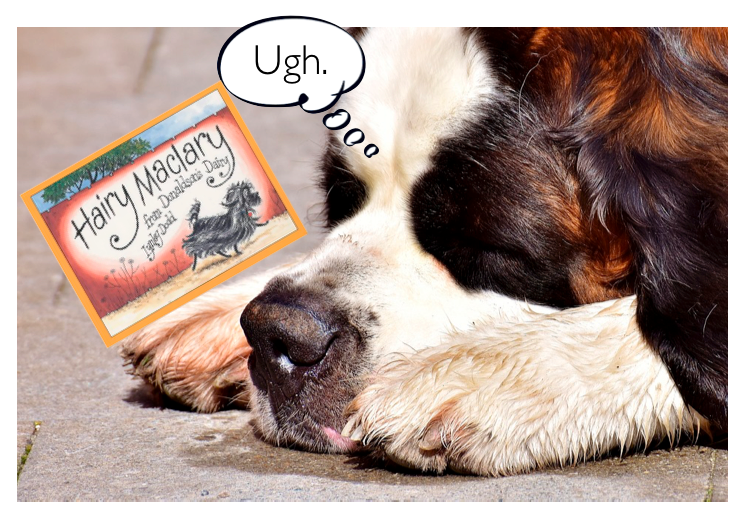
There’s no point reading when your brain feels tired. Reading with a tired brain will only kill your love of reading. Stop before you start to hate it. Stop when things start to feel really painful.
Remember this, one hour of reading with a fresh brain is better than three hours of reading with a tired brain.
13. Feel free to skip entire sections of a book
You don’t have to read the book from cover to cover. You don’t have to read every single word or chapter for that matter.
This is where reading with a clear purpose comes in handy. Ask yourself, “Why am I reading this book? What do I need to find out?” Then turn to the contents page and/or index and pinpoint the sections that are relevant.
Don’t get bogged down with a book. Get what you need from a book and then move on. On that note…
14. You don’t have to finish the book
If you’re not getting anything good from a book, call it quits. This can be hard to do though. Once you start a book (no matter how bad it is), you feel like you need to push through until the end. It feels like you get no “points” or gold stars for a book you don’t finish.
I’m a firm believer that if a book doesn’t grab you in the first one to two chapters, then say sayonara to it (for the time being).
Release the burden of the book by returning it to the library. If you purchased the book, pop it back on your bookshelf. Don’t get rid of the book just yet because the book may not actually be that bad. You just may not be ready for it.
15. Every book has its time
I recently picked up a book that I had read 10 years ago. I remember thinking when I first started reading this book, “This book is terrible. I hate the way it is written”. I was pleasantly surprised to discover that 10 years later when I picked up the book again, I actually enjoyed reading it. It was full of practical advice that my younger self couldn’t fully appreciate.
You’ll either be ready for a book or not. If you’re not ready, don’t stress. Maybe next year you will be.
Have you ever read a book that changed your life? Do you have any tips for reading more and better books? If so, feel free to leave a comment below.
Share This:
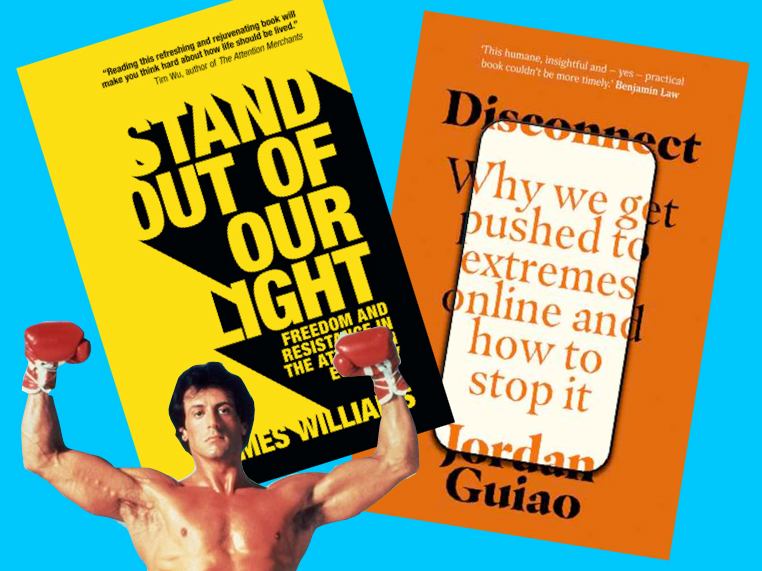
I read some absolute gems.
I’m a firm believer that a good book can change your life. This is why I make time to read every day.
As Australian actor Francis Greenslade advises in his book How I Learnt to Act:
“Read novels and plays and poetry. Read everything. I can’t stress this enough. Reading gives you so, so much. The more you read, the more new ideas you absorb, and the more new situations you experience . . .
The more you read, the greater your powers of concentration. What’s even more beautiful about reading is that it puts you into the head of someone else. It forces you to abandon your view of the world and take on anothers. In other words reading gives you empathy . . .
And it’s never too late to start. Read a book and you’ll become a better actor. But Snapchat and glossy magazines and online games – they don’t give you anything.”
1. Dopamine Nation: Finding Balance in the Age of Indulgence by Dr Anna Lembke
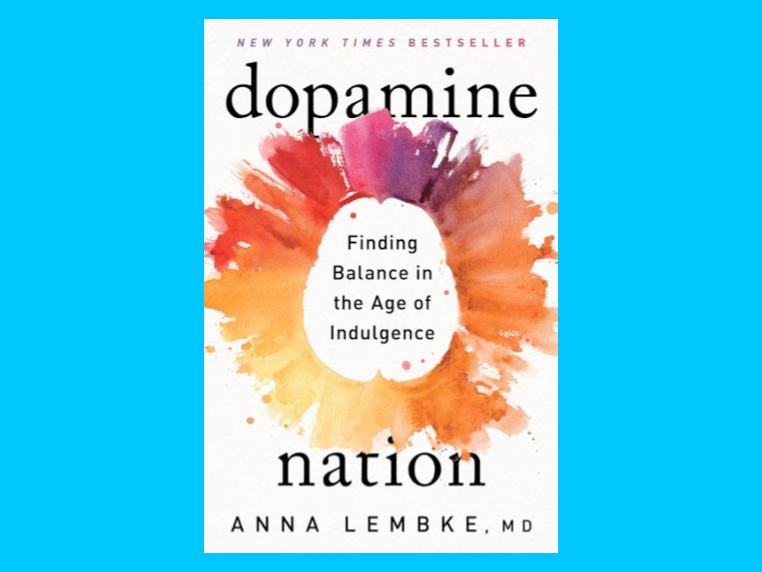
In Dopamine Nation Psychiatrist Dr Anna Lembke argues that in the modern world most of us are running from pain. Whether we’re numbing ourselves with drugs, bingeing on Netflix, gambling, or compulsively shopping online, we’re “distracting ourselves from ourselves”. Lembke states:
“The reason we’re all so miserable may be because we’re working so hard to avoid being miserable.”
Dr Lembke shows readers a path to living a more authentic and fulfilling life.
Spoiler alert: the good life isn’t about having whatever you want, whenever you want. It’s about embracing the discomfort of the present moment and giving our dopamine receptors a chance to regenerate.
2. Stand Out of Our Light: Freedom and Resistance in the Attention Economy by James Williams

Ex-Google strategist turned philosopher James Williams has written a brilliant book on the importance of reclaiming your attention and fighting back against the persuasive techniques used by the attention economy (i.e., big tech companies).
This book helped me to clearly see that the goals of big tech companies are not aligned with my personal goals. These companies do not have our best interests at heart. Williams argues if you want to be truly free and reclaim your capacity to think, you need to extract yourself from these machines of industrialised persuasion.
3. Stolen Focus: Why You Can’t Pay Attention – and How to Think Deeply Again by Johann Hari
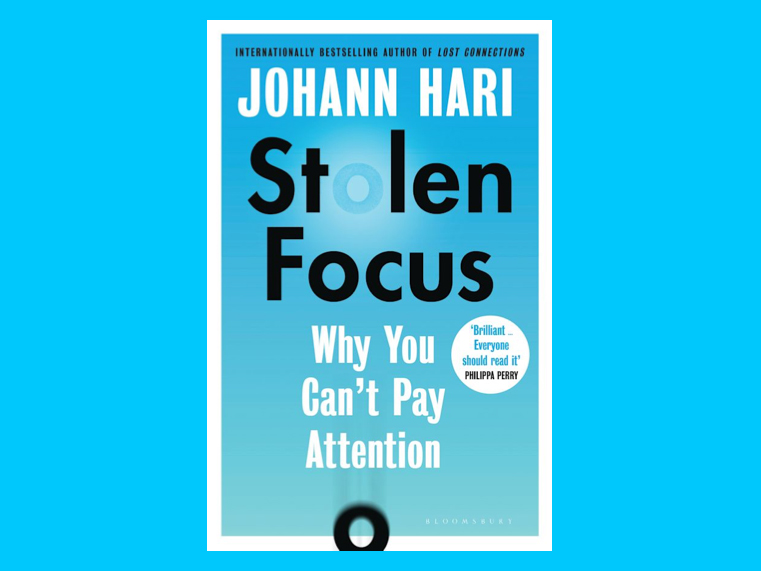
Johann Hari deserves an honorary doctorate for this literary masterpiece. In Stolen Focus, Hari travels the world interviewing experts to understand why our ability to focus has degraded and what can be done about it.
This is a complex, multipronged problem. Hari argues that we need systemic change to solve this crisis of attention (individual action won’t cut it). And this crisis of attention desperately needs our attention. If we stand any chance of solving the major issues we currently face (e.g., climate change), we need to build a social movement to reclaim our attention.
4. Mindful Self-Discipline: Living with Purpose and Achieving Your Goals in a World of Distractions by Giovanni Dienstmann

Being self-disciplined is the key to achieving your goals. But with just one click, you can get sucked into a world of instant gratification. How can you cultivate greater self-discipline in the age of distraction?
Giovanni Dienstmann has thought deeply about this question. In Mindful Self-Discipline he explores the many aspects to cultivating self-discipline. Topics include avoiding the trap of easy dopamine, creating a focus-friendly environment, letting go of unfair comparisons, and cultivating time awareness. This is the best self-help book I have read in a long time. I highly recommend it.
5. Time Wise: Powerful Habits, More Time, Greater Joy by Dr Amantha Imber

I’m a little sceptical of most productivity and time management books, but I enjoyed reading this book by Dr Amantha Imber. It’s a collection of strategies gathered from her popular podcast ‘How I work’.
I particularly liked the strategies presented to deal with addictive technology.
Some of my favourite strategies included:
• Putting rubber bands horizontally across your phone screen: this acts as a physical barrier to checking your phone.
• Solitude deprivation: Having time to be alone with your thoughts (no inputs from technology). This involves planning when you want to receive inputs from your phone and other devices.
• Creating stopping cues: Social media companies use strategies to keep you scrolling and clicking. To combat features like the infinite scroll, you can create your own stopping cues (e.g., having a set time to log off).
6. Move the Body, Heal the Mind: Overcome Anxiety, Depression, and Dementia and Improve Focus, Creativity, and Sleep by Dr Jennifer Heisz by Dr Jennifer Heisz
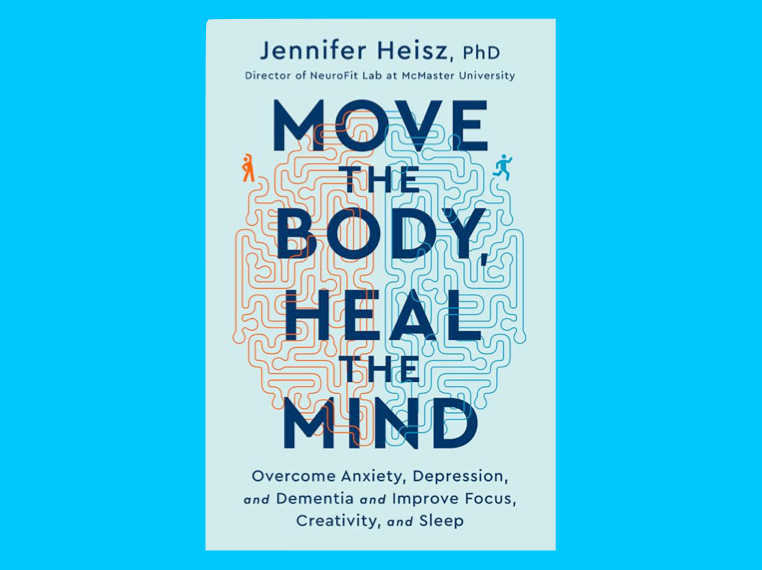
Over the years I’ve read a lot of books on the benefits of exercise but this book tops the list!
Neuroscientist Dr Jennifer Hiesz does a superb job presenting the science behind what exercise does for brain health, mental health, and preventing dementia.
Reading this book was like having a light bulb go off in my head. It gave me a deeper appreciation of exercise and how it has helped me to reduce anxiety, keep depression at bay, enhance my focus, and get through challenging times.
7. Disconnect: Why We Get Pushed to Extremes Online and How to Stop it by Jordan Guiao
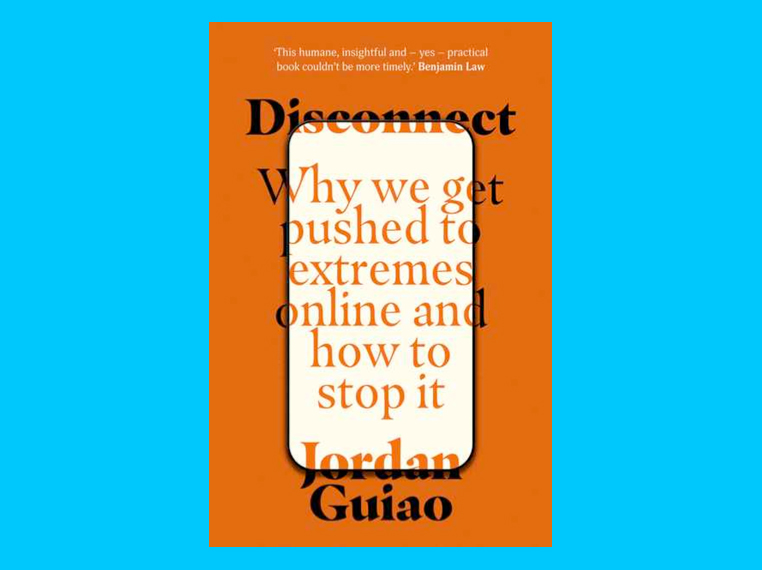
This year I have had more conversations with people who believe in conspiracy theories than in the previous 10 years of my life. It’s alarming. How did we get here?
If you know someone who has fallen down conspiracy theory rabbit holes, this book will help you understand how this happens and what you can do to help your loved ones. Guiao also explores a number of other Internet related issues including social media narcissists, naïve futurists, hateful trolls, and dating app pests.
So, there you have it! Those are my favourite nonfiction books for 2022. They were packed full of life changing strategies and wisdom. I’m grateful to these authors for sharing their ideas with the world.
What books did you enjoy reading this year?
I’d love to hear your recommendations.
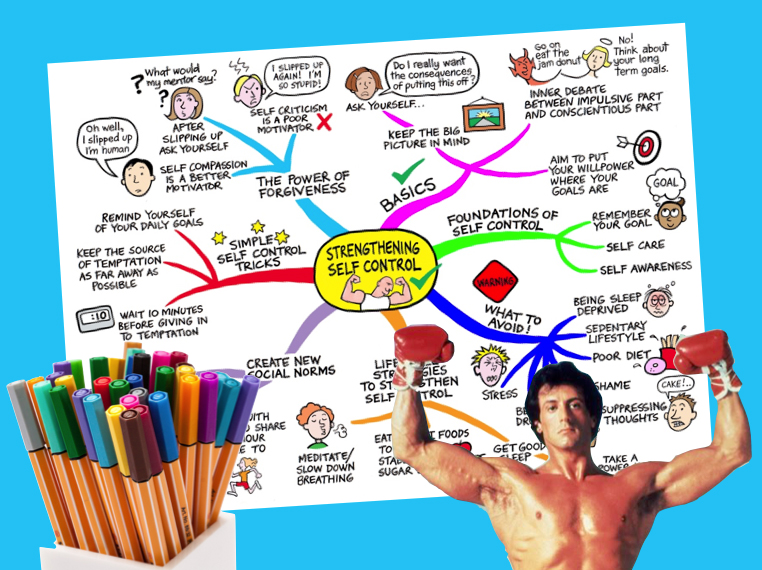
The funny drawings, the colour, and creativity can transform any dry subject into something that’s interesting for the brain.
But mind mapping is also a great life strategy. You can use it to create plans, capture ideas from books, set goals, clarify your thinking, organise your finances, and work your way out of messy situations.
Below I explore some different ways you can use mind maps in your day-to-day life.

Do you ever read books and then feel frustrated when you can’t remember much from them?
This is why I mind map out every non-fiction book that I read.
I know that there are limits to my memory. If I want to be able to extract ideas and strategies from a book and apply them to my life, I’m going to need to create mind maps.
There are two ways you can mind map a book:
1) You can mind map as you read: this forces you to slow down and really think about the ideas. I highly recommended doing this if the content is really complex. But this approach can be slow going!
2) You can mind map once you’ve finished reading: I use mini post-it notes to tab key ideas as I read. Once I’ve finished reading the book, I go back and mind map out the tabbed ideas. This way I have some perspective and can identify what’s important and what’s not (rather than assuming every sentence is important and needs to be mind mapped).
After I’ve finished mind mapping the book, I select a strategy that I’ve captured on the mind map to test out.
My husband has always been amazed at how I can take ideas from books and apply them to my life. But there’s no magic to this. I’m able to use lots of different strategies because mind mapping helps me to understand and remember them.
Let’s face it, if you can’t remember a strategy, you can’t use it!
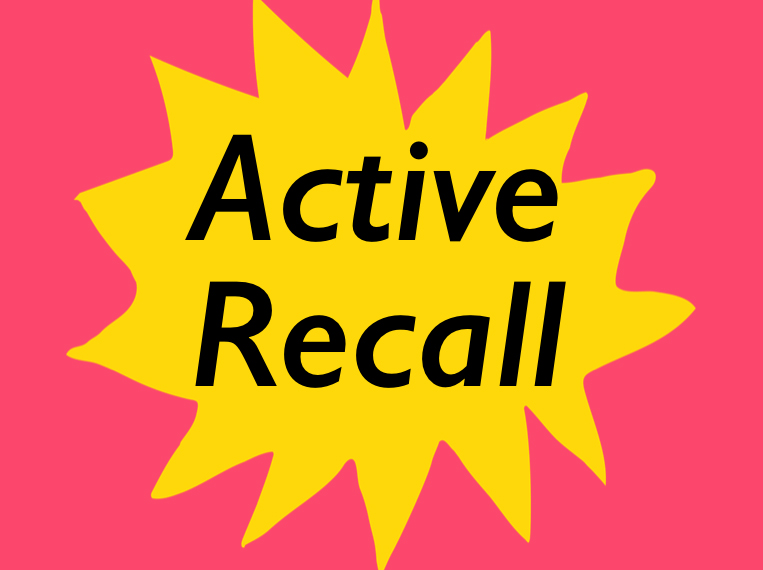
Let’s say you have a test or exam coming up. Here’s how you can use mind maps to effectively prepare . . .
Push your notes and books to the side (you can’t look at them). Now grab a blank sheet of paper. Set a timer for 5 minutes and try to create a mind map on the main ideas you can remember.
Don’t try to make these mind maps look pretty. You’ve only got 5 minutes, so scribble and draw out as much as you can remember.
Once you’ve exhausted your memory, pull out your notes and pick a different coloured pen. Take a look at your messy mind map: What did you get right? What did you get wrong? Where are the gaps in your knowledge?
This strategy is called Active Recall and it’s the most effective way to retain information. You can read more about it here.
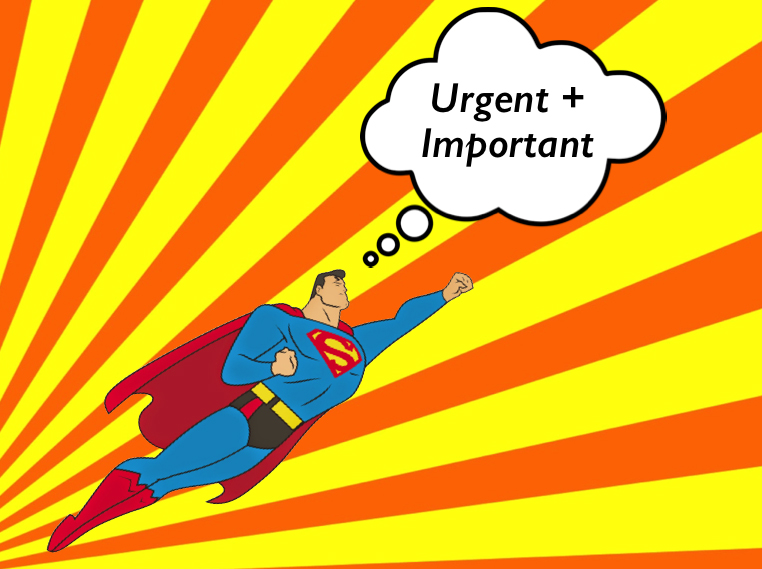
When you feel overwhelmed by life, everything can feel urgent and important. But not everything is urgent and important. A little prioritisation can save you a lot of stress and drama.
Grab a big sheet of paper, draw a circle in the middle, and write inside it Stuff to do. Now get everything out of your head and on to the page!
Once you’ve finished your mind map, look over all the tasks.
If a task is important, give it a tick.
If a task is urgent, circle it.
Focus your energy on knocking off the tasks that have ticks and circles around them (they are urgent and important).
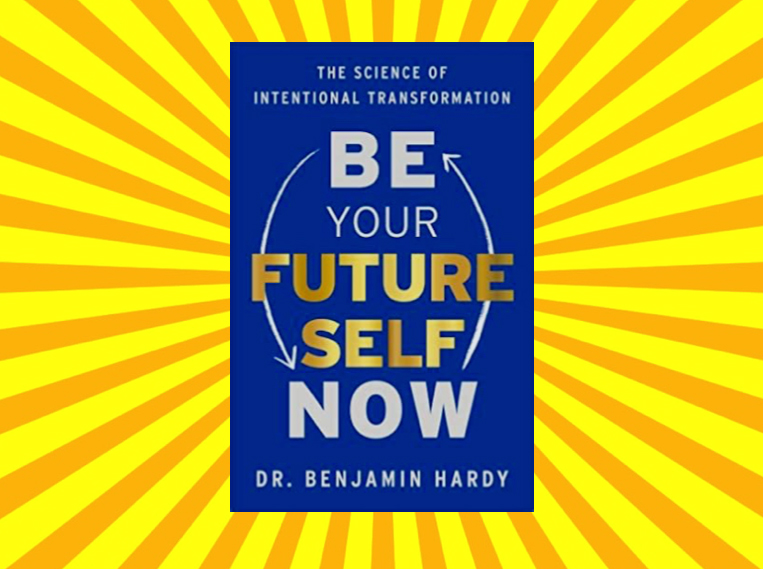
Research shows the more connected you are to your Future Self, the more committed you will be to achieving your goals and the wiser decisions you will make in the present.
Draw a circle in the middle of page and write inside it My Future Self. You can create branches for your Future Self in:
• 3 months’ time
• 6 months’ time
• 1 year’s time
• 3 years’ time
• 5 years’ time
Then off each of these main branches, write down your goals. What do you want to have accomplished by this time?
As Dr Benjamin Hardy states in his book Be Your Future Self Now:
“The clearer you are on where you want to go, the less distracted you’ll be by endless options.”
Note: Imagining your Future Self is not an easy thing to do. We are terrible at imagining where we are going to be in the future. So, don’t overthink it. Just get some ideas down on paper. As you gain more clarity around your goals and values, you can always add extra branches to your mind map.
I’ve found mind mapping to be a fun and effective way to capture, organise, and retain information. Even if I never look at the mind map again, the process of getting ideas down on paper makes a big difference. It helps me to feel more in control and on top of things.
If you need some clarity in a particular area, stop ruminating. Pick up a pen and start mind mapping!
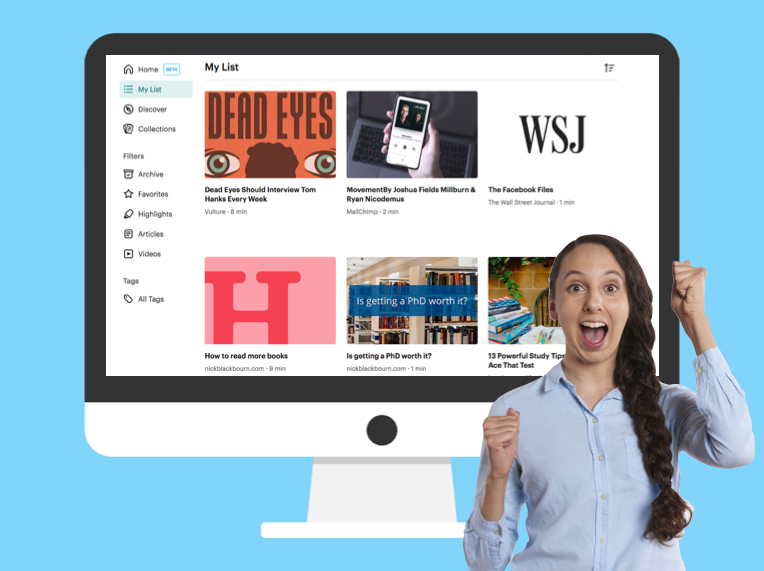
How do you do it without getting derailed by a tsunami of ads, click-bait, notifications and hyperlinks?
Your brain is up against many carefully crafted apps and video games that are designed to steal your attention.
This article is about how you can read online without ending up places you never intended to go.
I’m going to share strategies and guiding principles that help me to stay focused when I’m reading on a screen.
Let’s face it, we all need help with this. The temptation of fun apps and websites are only a few clicks away! But you only have so much mental energy. You need to know how to harness it and direct it towards the things that really matter.
I won’t deny it. I like being able to hold books and articles in my hands. This is why I buy a lot of books and get the Guardian weekly delivered to my door.
Being able to easily scribble down questions and draw pictures in the margins helps me to learn and understand the material.
If the information is really important and/or complex, I highly recommend printing it out. But for all other written works (e.g., blogs, emails, movies or book reviews), try implementing the following ideas and strategies.
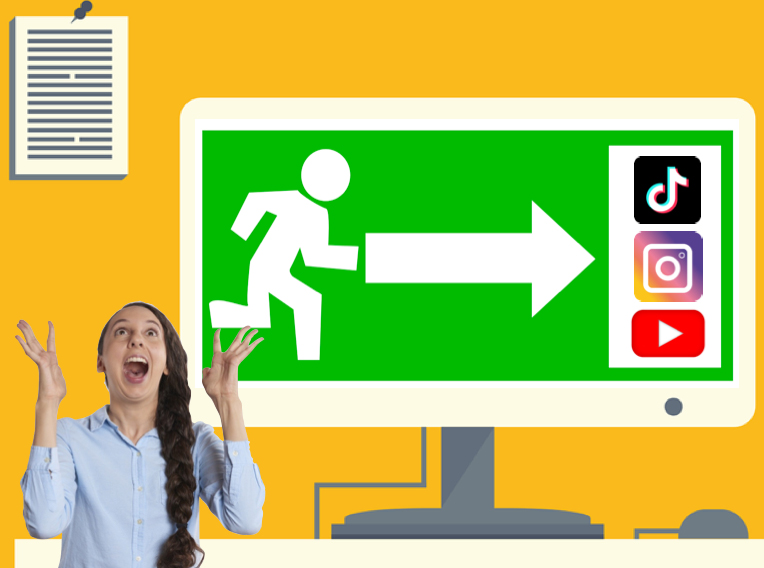
The human brain loves comfort. It loves the familiar.
But reading can be challenging and downright uncomfortable for the brain.
If you’re reading an article on a subject that is completely new to you and/or conflicts with your pre-existing beliefs, your brain is likely to have some kind of adverse reaction. It’s going to be like “What is this?! I don’t like this!”.
You’ll feel the urge to escape from this mental discomfort. Therein lies the problem with reading something online . . .
You have lots of easy escape routes (e.g., social media, YouTube, and Netflix). These escape routes give your brain instant relief and gratification. But they also take you further away from your goals and what you need to do (hello, life regrets!).
Don’t give your brain any room to run. Block the escape routes.
Before you sit down to read, set yourself up for a successful online reading experience. For example, here’s what I do:
• I put my phone on silent and place it in another room
• I activate an Internet blocker app called Freedom
• I clear away any clutter on my desk (I dump it in a box)
• I switch off any distracting music that’s playing (generally anything that contains lyrics)
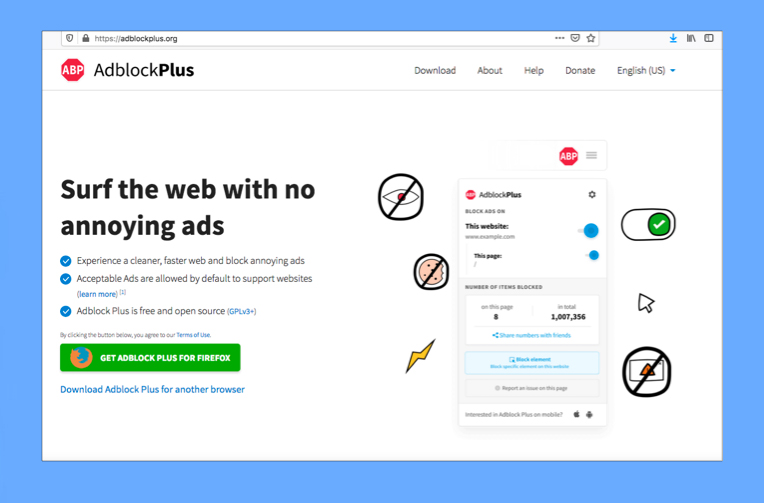
We all know the online world is not the real world. But there’s one irritating feature both worlds have in common: advertising.
The nasty thing about online ads is they are way more targeted (you can thank surveillance capitalism for that!).
Like all advertising, I see online ads as a form of mental pollution. They don’t add anything to your online reading experience, except noise, stress and visual clutter.
Online ads can easily derail your attempts to learn and grow. Plus, they can rapidly deplete your bank balance!
This is why I recommend installing an adblocker plugin to remove ads from webpages, social media and search engines.
Check out AdblockPlus. It’s free and highly effective.
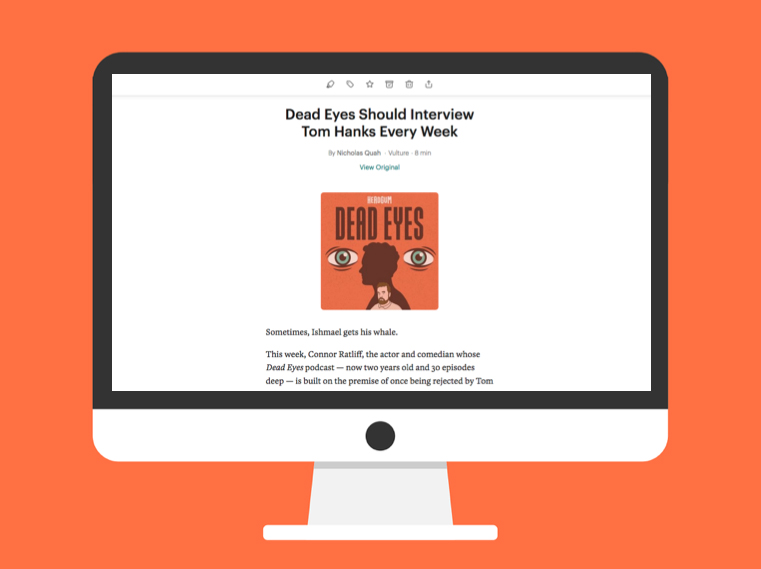
When reading an article, you want to be able to focus on just the content. Most of the time, you don’t need to see side bars, pop-up boxes and other people’s angry comments. This is online clutter that overloads your working memory and depletes your brainpower.
The good news is you can eliminate this clutter by using a free app called Pocket.
Pocket allows you to save articles in your web browser. You can then open the article up without all the other clutter that appeared on the original webpage.
When you open up an article in Pocket, you’ll see a lot of white space around the text. Your brain will say “Thanks!”. Using Pocket makes for a much nicer and easier reading experience.
Take out a notepad and pen and make notes as you read. Not only is it super handy to have something to refer back to but it will help you to understand the information more easily.
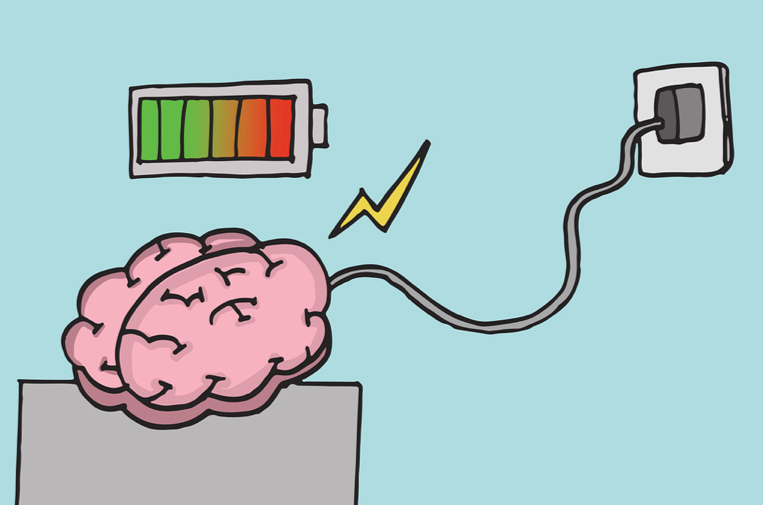
Reading may seem like a passive and ‘easy’ activity. But don’t be fooled. Reading requires serious brainpower.
What can help to supercharge your brain to get through all those articles and chapter readings?
I find two things help a lot:
1) Healthy snacks (ideally, within arms reach)
2) Power naps
Before I get stuck into a serious reading session (anything more than 30 minutes), I will sometimes make myself a little platter with veggie sticks, a dip and crackers.
It’s like the act of preparing the platter is helping me to mentally prepare for the task ahead. I’m also combining something tasty with something that can feel hard (i.e., reading). This seems to make the task of reading a complex article a little more pleasant for my brain.
As for the power naps, I typically use these to recharge my brain after reading academic papers.
It’s hard to absorb ideas and learn skills when you’re feeling exhausted. This is why I take power naps and prioritise sleep. It’s not a smart idea to try learning anything new late at night. You’re not going to remember very much.
Hit the sack and commit to waking up early and doing a little reading first thing in the morning.
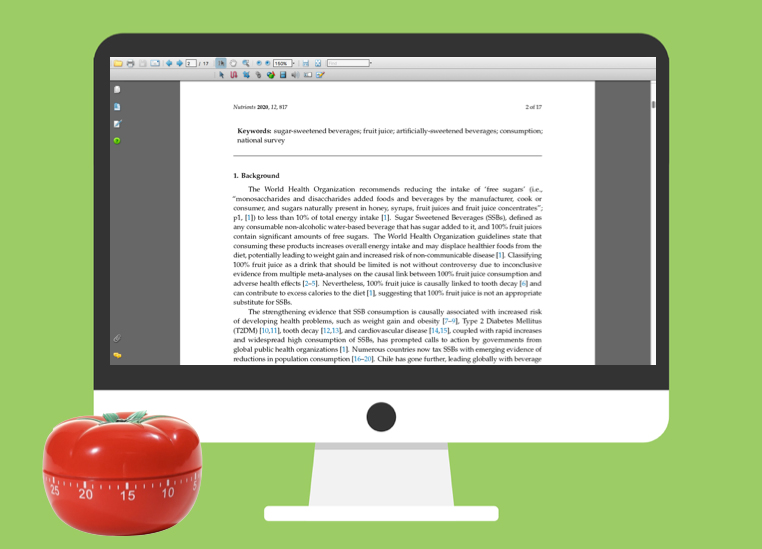
Decide on how long you’re going to read for. Then set a timer and go! Give the articles your full attention for this period of time. I find 25 minutes is a good amount of time for focused reading.
After sitting and reading for 25 minutes, I like to get up, stretch and look out a window to give my eyes a rest.
If you want to be able to remember what you read on a screen, you need to be able to focus your mind. You can’t be jumping around all over the Internet.
But this is not how most of us read online. We skim and scan pages, click and scroll. Like a poker machine, the Internet has trained us to be on the look out for anything that it going to light up the reward pathways of our brain.
You need to appreciate that reading a chapter isn’t going to instantly light up your brain in the same way that social media is designed to do. This is why it’s so important to set yourself up so you can read deeply and get to the end of an article. And if you made it this far, well done!
Dr Jane Genovese delivers interactive sessions on learning to learn, combating procrastination, exam preparation, how to focus in the age of distraction, habit formation and much, much more!
Get FREE study and life strategies by signing up to our newsletter:
© 2024 Learning Fundamentals